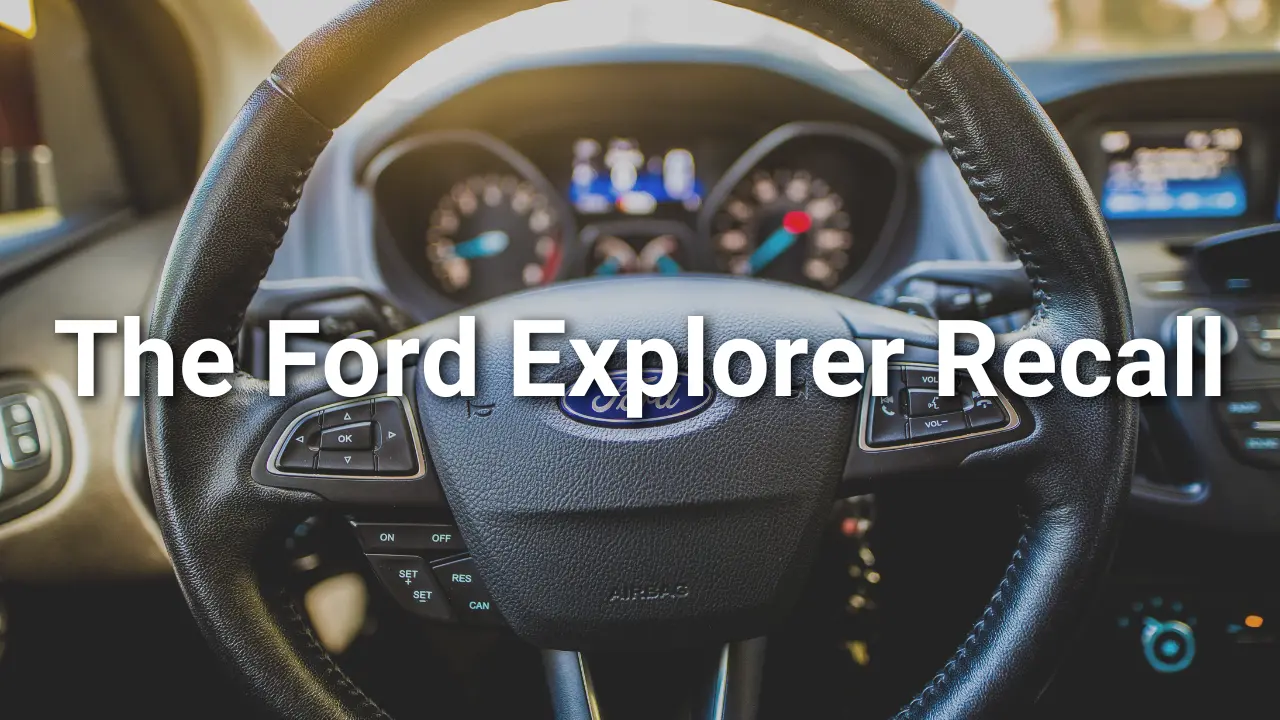In the world of automotive enthusiasts, a saying goes, “The car you drive says a lot about you.”
But what if your car could speak volumes about the manufacturer’s safety practices and the dealer’s accountability?
The recent recall of the 2022 Ford Explorer, one of the largest in recent history, is a stark reminder of the importance of purchasing a safe car and staying informed about any potential recalls.
Let’s take a hypothetical journey with John, a proud owner of a 2022 Ford Explorer, who was oblivious to the recall notice until he experienced a near-accident due to a faulty rear suspension.
His story is a cautionary tale for all car owners and potential buyers. But let’s hold onto that moment and delve into the recall’s specifics.

A History of Recalls: The 2022 Ford Explorer
The 2022 Ford Explorer has been subject to several recalls in recent years. The most significant was a problem with the rear suspension that could cause the vehicle to roll over. The recall affected over 2.9 million Explorer SUVs in the US alone.
Other recalls include issues with the engine cooling, where a leak could cause a fire, and a problem with the seat frames, which could increase the risk of injury in a crash.
The 2022 Ford Explorer recalls encompass a wide array of issues, each with different implications for vehicle safety and operation. Here is a detailed breakdown of each recall:
- Loss of the rearview camera image: This issue could reduce the driver’s rear visibility, increasing the crash risk. This recall was announced on May 12, 2023, and affected 422,201 vehicles
- Rearview camera not displaying an image: Similar to the first recall, this problem could also reduce the driver’s rearview, increasing the risk of a crash or injury. This recall was announced on April 28, 2023, and affected 523 vehicles
- Electronic parking brake issue: Without the electronic parking brake applied, the vehicle could roll away if the driveshaft disconnects. A disconnected driveshaft can also result in a loss of drive power. Either of these scenarios can increase the risk of a crash. This recall was announced on March 24, 2023, and it affected 674 vehicles
- Damaged park system: A damaged park system may not shift into “PARK,” resulting in a vehicle rollaway and increasing the risk of injury or crash. This recall was announced on February 10, 2023, affecting 3,674 vehicles
- Inability to secure the vehicle in park position: This issue can result in a rollaway, increasing the risk of a crash or injury. This recall was announced on February 10, 2023, and it affected 1,138 vehicles
- Improperly tightened fuel line connection: This could result in a fuel leak, increasing the fire risk. This recall was announced on September 14, 2022, and it affected 69 vehicles
- Improperly heat-treated engine rails: This could reduce the vehicle’s structural protection in a crash, increasing the risk of injury. In addition, an engine rail may detach and contact the road while driving, increasing the risk of a crash. This recall was announced on June 24, 2022, and it affected 776 vehicles
- Detached fuel filler tube: This could result in a fuel leak, increasing the fire risk. This recall was announced on February 16, 2022, affecting 18,366 vehicles
Each of these recalls presents a unique risk and has led Ford to take action to repair or replace the problematic components.
The number of vehicles affected by each recall varies, illustrating the breadth and complexity of these issues. It also underscores the importance of staying informed about vehicle recalls and the need for regular vehicle maintenance and inspection.
The Risks: Safety Concerns and Ford’s Response
Each recall represents a potential safety risk. The rear suspension problem, for instance, could lead to a loss of control while driving, increasing the risk of a crash.
Similarly, the engine cooling issue could result in a fire, while the seat frame problem could exacerbate injuries in an accident.
In response to these issues, Ford has initiated recalls to repair or replace the problematic components. They have also pledged to improve their quality control processes to prevent future recalls.
Staying Informed: Resources for Checking Vehicle Safety
For consumers, it’s crucial to know whether a car is good or not or if it’s a ‘lemon.’
Resources such as the National Highway Traffic Safety Administration (NHTSA) website, Carfax, and Autotrader can provide valuable information on recalls, accidents, and other problems.
By entering your car’s Vehicle Identification Number (VIN) on these websites, you can check if your car has been recalled.
The Conclusion: Implications and Recommendations
The Ford Explorer recall saga underscores the importance of staying informed about vehicle safety.
It’s a stark reminder for potential buyers to do their due diligence before purchasing. For Ford, it’s a call to improve the reliability of their vehicles to prevent such incidents in the future.
Returning to John Doe’s story, he was fortunate to escape unscathed from the near-accident. But his experience serves as a wake-up call for all car owners to stay informed about recalls and ensure their vehicles are safe to drive.
References:
- National Highway Traffic Safety Administration (NHTSA) website: www.nhtsa.gov
- Carfax vehicle history report service: www.carfax.com
- Autotrader online car marketplace: www.autotrader.com
- Car Complaints: https://www.carcomplaints.com/Ford/Explorer/2022/recalls/












